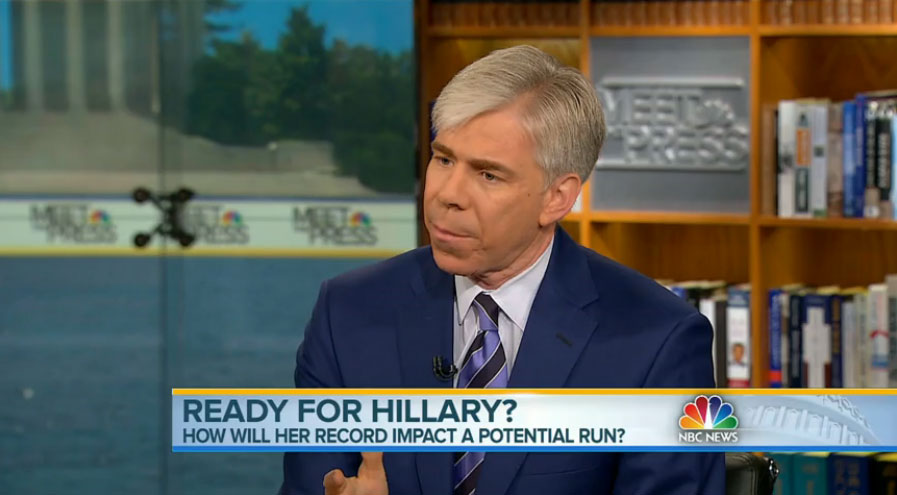
NBC's David Gregory pointed a series of questions about Hillary Clinton's role in the 2012 Benghazi attacks to Senator Rand Paul (R-KY), allowing Paul to attack Clinton with the long-debunked smear that she was aware of the need for additional security forces at the Benghazi compound yet denied the requests.
On the June 22 edition of NBC's Meet The Press, host David Gregory posed a series of questions on Hillary Clinton's role in the 2012 attacks on diplomatic facilities in Benghazi, Libya, but failed to correct Sen. Paul's false smears that Clinton refused requested security. While discussing the possibility of Clinton running for president in 2016, Gregory asked Sen. Paul about whether “the prosecution of foreign policy,” is “the main argument” against Clinton's candidacy. In his response, Paul invoked the debunked myth that Hillary Clinton refused “multiple requests for more security” in the months leading up the attacks.
Later in the interview, Gregory asked whether Benghazi is “disqualifying” for Clinton's potential 2016 candidacy, again allowing Sen. Paul to claim that Clinton “was not responsive to multiple requests for more security.” Paul concluded that the American people “want a commander in chief that will send reinforcements, that will defend the country, and that will provide the adequate security,” implying for a third time that Clinton refused security she knew was necessary to the Benghazi compound:
But Sen. Paul's smear is based on an old, discredited right-wing media attempt to blame Hillary Clinton for the deaths of U.S. personnel in the Benghazi attacks that originated with an April 2013 Republican Report. The report claimed that an April 2012 cable, sent under Clinton's name, was a “critical cable” that called for reductions in security in response to to the U.S. ambassador's request for additional security resources. The report's evidence that the cable came from Clinton was that it bore her signature, though as Media Matters noted at the time, “several news outlets reported that it is routine for outgoing messages from the State Department to be sent under the secretary's name without the secretary's direct involvement.”
Sen. Paul's claims have been discredited for quite some time -- Clinton's signature was standard for every cable, and does not indicate her direct involvement in the cable. As Foreign Policy magazine pointed out:
It's not clear who in the State Department sent the April 19 response. But as a general rule, “every single cable sent from Washington to the field is sent over the secretary of state's name,” a former State Department official noted, adding, “Though they are trying to make this new, it's not. After 30+ hearings and briefings, thousands of pages, this has all been addressed.”
In September, House Democrats corrected the Republican report, explaining, “The Committee has now obtained the cable referenced by Chairman Issa, and it includes a pro forma line with former Secretary Clinton's name, similar to millions of other cables sent from the State Department.”
Washington Post fact-checker Glenn Kessler, who spent nine years covering the State Department, wrote that “every cable from an embassy bears the 'signature' of the ambassador -- and every cable from Washington bears the 'signature' of the secretary of state,” concluding that “Issa has no basis or evidence to show that Clinton had anything to do with this cable -- any more than she personally approved a cable on proper e-mail etiquette. The odds are extremely long that Clinton ever saw or approved this memo.” Additionally, in an interview with Media Matters, a former 27-year foreign service officer and Accountability Review Board member corrected the claims, saying, “Every single cable going out is signed 'Clinton,' it is the normal procedure... Millions of cables come into the operation center every year, not thousands, millions. And they are all addressed Hillary Clinton.”